The Conceited Cow: An Indian Folktale of Modesty and Wisdom
Reading Time: 9 min
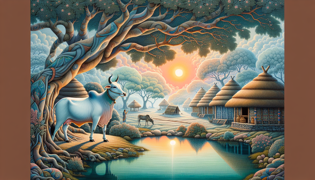
About Story: The Conceited Cow is a from india set in the . This tale explores themes of and is suitable for . It offers insights. An Indian folktale about a boastful cow who learns humility when confronted by others more skilled, emphasizing the value of modesty and the lesson that there’s always someone better.
Introduction
In a quiet hamlet by the banks of the Ganges, the air shimmered with golden dust and the scent of fresh coriander. Kingari the cow strutted through the paddock like a queen surveying her realm. Her milky white hide gleamed in the morning sun, as if polished by an artist’s brush. She lowed with pride and declared herself the finest beast from Varanasi to Vrindavan. “I’m the grandest creature this side of the river,” she’d proclaim, her voice rising like temple bells at dawn.
Villagers paused in their chores to watch her preen. Even the goats would sidle away, mumbling, “Sacred cow!” in awe. Kingari would toss her head and rib herself. She bragged of her yielding udders, claimed she could outpace the swiftest horse, and insisted no lamb or calf could match her strength. Local folks would joke, Achha ji, but secretly worry she might topple their well‑tended crops with her swagger.
Yet beneath the bravado lay an itch for true acclaim. Kingari sniffed at the fragrant grass, each blade a reminder that she deserved praise above all. The distant clang of the temple gong rolled across the fields like thunder, urging her on. She vowed that before the next full moon, everyone—man, beast and bird—would acknowledge her superiority. Little did she realise that destiny had other plans, and that humility might be the greatest treasure she’d ever acquire.
The Cow's Boast
Kingari woke before daybreak, her tail flicking like a feathered fan across her sleek flank. She’d heard the cockerel crow two villages away and knew the hour favoured her grand declarations. She ambled to the pasture gate, where the grass lay cool and dewy, like velvet between her hooves. She paused mid‑stride and let out a triumphant low that shook a cluster of gourds on the fence. This morning, she announced, she would challenge any animal—big or small—to outshine her.
When the goats heard her, they bleated with laughter, for no goat believed itself swift enough to match Kingari’s steps. The sheep, however, ambled in with calm curiosity. “What’s all the fuss about?” asked a grey ewe. The cow puffed her cheeks and proclaimed that she could carry more bundles of hay on her back than any creature under the sun. The sheep tilted her head, her fleece almost humming with softness like cloud drift on a hot breeze.
A nearby almond tree released a faint aroma of nuts and blossoms, as though offering itself to witness the contest. Crunch of brittle leaves under hoof, faint bleat blending with distant temple bells created a gentle symphony. Kingari challenged the ewe: “Load me up then, if you believe your wool beats my strength!” The sheep calmly bent to the farmer’s cart and hopped on. In moments, the cart groaned under the ewe’s weight—but the cow had refused to attempt the feat.
At sunset, the villagers gathered. Kingari paraded before them, her hooves sending tiny tremors across the dusty ground. Yet the sheep had already shown her mettle, balancing on the cart as if it were a rolling cloud. A hush fell as the moon rose, silver and watchful. Kingari realised that her boast had been hollow. Blood tightened at her temples as she murmured, “Who knew wool could bear burdens of stone?” The sheep merely winked and strode away. In that still hour, the cow tasted the first hint of humility, as sharp as tamarind on the tongue.
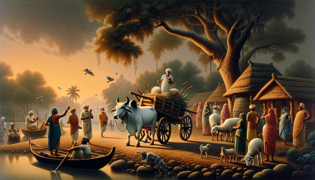
Challenges from the Sheep
Humiliated by the sheep’s quiet triumph, Kingari brooded beneath the banyan’s shadow. Feathery leaves rustled overhead, as if casting judgment. She pawed the earth and vowed to prove her superiority in speed. At dawn, she challenged the sheep to a race along the riverbank. Local kids lined the dry track, tossing marigold petals in the air like bright confetti.
The scent of wet clay drifted from the river’s edge, and cicadas drum‑rolled their relentless song. Kingari lunged forward with a thunderous gallop, her muscles rippling like silk banners in a sudden breeze. Cloud of dust curled behind her. The sheep trotted swiftly, but soon the cow was metres ahead, humming with triumph as temple bells chimed in the distance.
Yet halfway down the track, a lean ram joined the chase—an uninvited contender. The ram teased Kingari with a playful flick of horns, vaulting past her with the ease of a kite riding monsoon winds. Every hoof‑beat of the ram seemed light as lotus petals, yet carried the force of a storm. Villagers gasped, uttering, “Arre wah!” like fireworks in celebration.
Kingari strained to follow but felt her breath shudder down her spine. The heat of competition burned hotter than the midday sun. Before she could recover, the ram crossed the finish line, dust erupting like pale smoke behind him. The sheep had finished second, the cow third. Silence reigned until a child piped, “There’s always someone faster.” That night, Kingari chewed cud beneath the star‑strewn sky, her pride dampened like a half‑forgotten festival. For the second time, she tasted humility—and found it strangely more lasting than victory.
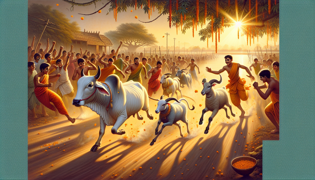
The Agile Monkey's Lesson
Word of the cow’s reversals spread across the village, reaching the ears of Rambhau the monkey, whose nimble bounds were the talk of every garden. Rambhau swung down from the banyan with a grin like a sprouting mango. “Why settle for slow contests?” he chattered. “Let’s test your agility.”
Kingari drew herself up proudly. The monkey draped a garland of jasmine round her horns, its fragrance curling through the noon air like wispy ribbons. Subtle breeze carried the jasmine scent, and distant prow of a stray dog echoed across the courtyard. Rambhau invited her to climb the temple steps faster than he could leap from tier to tier.
The marble helix was slick with moss and offerings of sandalwood paste. Rambhau scampered up, his tail twirling like a silk ribbon in the breeze, each leap an effortless poem. When he reached the summit, he tossed down flowers as proof. Kingari planted her hooves on the first step and tried. She slid. Her sides brushed the cool marble; the stone felt smooth as butter under her coat. She strained, but gravity tugged her back.
A hush fell as villagers realised the cow could neither ascend nor descend without stumbling. Rambhau tossed her a banana, saying kindly, “Achha ji, strength is more than muscle. It’s knowing your limits.” Kingari’s heart sank deeper than the well’s dark water. She bowed her head as if the monkey’s words were a gentle rain washing away conceit. In that simple gesture, she understood that pride could tip her where grace would carry her.
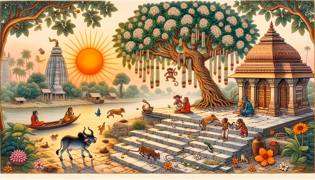
Lessons Beneath the Banyan Tree
By the edge of the village pond stood an ancient banyan, its roots like knotted serpents and its branches forming a leafy cathedral. Kingari retreated there, seeking counsel from Mridang the aged elephant, whose gentle eyes held wisdom older than the river itself. He trumpeted a greeting as she approached, his voice as deep as distant thunder.
Mridang invited her to join him in a game of water‑lifting: they would fill two pots from the pond and carry them across the clay floor without spilling a drop. Kingari accepted, convinced she could dam the Ganges if need be. The cow dipped her muzzle into the cool water, feeling the liquid run over her tongue like silk. She lifted her pot in her mouth, but every step she took jolted the vessel, spilling droplets like tears on the uneven earth.
Mridang, in contrast, wrapped his trunk around his pot with ease, each movement slow, deliberate and sure. His steps were soft thuds, his balance so exact the water never sloshed. A breeze rustled the banyan leaves, stirring the scent of damp bark and wild mint. Cicada chorus hummed in the background.
When they reached the finish line, the elephant’s pot brimmed full, while Kingari’s had lost half its water. She stared into the muddy ground, her gait faltering. The old elephant placed a reassuring foot beside her. “Strength comes not from pride but from practice and patience,” he murmured, trunk brushed kindly against her flank. In that humble moment, Kingari’s eyelashes flickered with gratitude and she finally grasped the power of modesty.
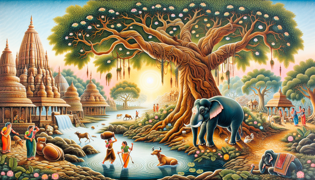
Conclusion
As the sun sank behind distant palm groves, Kingari returned to her pen—no longer strutting, but walking with quiet dignity. She had tasted defeat and discovered that humility was sweeter than any victory she’d once craved. The sheep offered her a gentle nod, the ram tipped his head in respect, and Rambhau the monkey chattered a cheerful farewell. Even Mridang the elephant trumpeted softly, as though welcoming her back into their circle without reserve.
The villagers whispered among themselves, hearing that the once‑boastful cow now carried herself with grace. Children patted her flank, exclaiming, “Such a lovely calm!” instead of “What a fine cow!” Kingari lowered her head in gratitude, her eyes reflecting the flicker of lantern light that danced across the courtyard each evening.
From that day onward, she spoke little of her own prowess. She helped the farmer till small patches of field, offered shade to wandering travellers and listened when the goats debated village gossip. She had learned that boasting was but a hollow shell—empty inside—whereas modesty and kindness were seeds that bore fruit richer than any treasure.
In time, her story spread beyond the Ganges to markets and riverside towns. Traders would smile and say, “Meet Kingari, the cow who discovered that there's always someone better.” And mothers would recount her tale to wide‑eyed children, reminding them that true greatness lies not in loud words, but in gentle deeds and a humble heart.

















